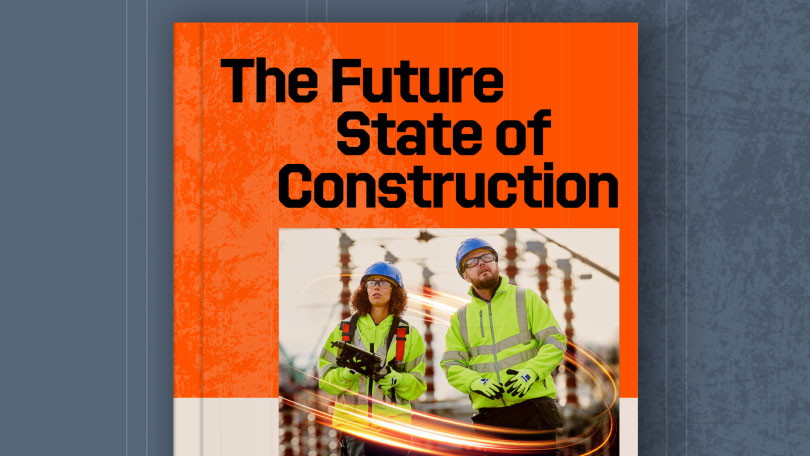— 9 min read
Construction Site Manager: Responsibilities, Skills, and Career Pathways

Last Updated Sep 25, 2025

Josh Krissansen
55 articles
Josh Krissansen is a freelance writer with two years of experience contributing to Procore's educational library. He specialises in transforming complex construction concepts into clear, actionable insights for professionals in the industry.
Last Updated Sep 25, 2025

Construction delivery in Australia is becoming more complex. Tighter programs, escalating material costs, and increasing WHS and compliance requirements are reshaping how projects operate on the ground. As commercial builds and infrastructure works grow in scale, the role of the construction site manager has never been more critical.
For Tier 1 contractors and mid-tier builders, site managers serve as the operational link between project strategy and daily execution. They coordinate trades, control safety and quality, and keep teams aligned in conditions where a single delay can trigger costly program overruns. Success in this role requires more than trade expertise. It demands digital fluency, strong leadership, and the ability to manage complex workflows in real time.
This article examines the construction site manager’s role in Australia. It clarifies how the position differs from other management roles, outlines the core responsibilities that define high performance, and maps the career pathways for professionals aiming to lead site operations at the highest level.
Table of contents
What is a Construction Site Manager?
The construction site manager directs on-site execution, ensuring every trade, resource, and task aligns with the master program and quality requirements.
As the on-site lead, the site manager coordinates subcontractors, drives program delivery, and ensures site activities align with project strategy.
The site manager usually reports to the project manager, making them the linchpin between high-level planning and on-site execution. In Australian commercial construction, this role is typically distinct from the project manager and construction manager:
- Project managers: Construction PMs are responsible for the entire project lifecycle, including budgeting, scheduling, stakeholder engagement, and contract administration.
- Construction managers: The role of the CM varies by context. It may refer to a consultant representing the owner or be used interchangeably with Site Manager in some delivery models.
Construction Site Managers focus on ground-level delivery, working closely with foremen and trades to manage workflow, uphold safety standards, and maintain construction quality. In smaller companies, they may also take on project-level responsibilities.
Core Responsibilities of Construction Site Manager
The role combines planning, supervision, and decision-making to maintain program, budget, and compliance under changing site conditions.
These responsibilities span every facet of site delivery, from upfront planning and resource allocation to safety enforcement, quality control, cost tracking, and issue resolution.
Project Planning and Coordination
- Sequence daily tasks to align with the master program
- Interpret drawings and specifications to direct on-site work
- Run daily briefings—like prestarts and foreman meetings—to communicate targets and priorities
Resource Management
- Coordinate subcontractors and labourers across all trades
- Monitor productivity using daily site reports and crew output tracking to address performance issues promptly
- Manage deliveries, storage, and equipment to avoid disruption
Safety Oversight
- Enforce compliance with WHS legislation and the National Construction Code
- Lead toolbox talks and ensure PPE is worn at all times
- Conduct site inspections and correct hazards immediately
Quality Control
- Inspect completed work against plans and standards
- Identify defects early to reduce rework and maintain the program
- Coordinate inspections with certifiers and regulatory authorities
Budget and Cost Management
- Track labour and material use to reduce waste through job costing and weekly cost reviews
- Address delays or inefficiencies that may lead to cost overruns
- Report potential budget risks to the Project Manager
Communication and Reporting
- Maintain daily site diaries with updates on progress, safety, and delays
- Liaise with the Project Manager and consultants to maintain alignment
- Communicate clearly with suppliers and on-site personnel
Issue Resolution and Escalation
- Respond to site-level issues such as weather disruptions or material delays
- Re-sequence works to maintain momentum where needed
- Escalate structural, program, or contract concerns for resolution
Skills and Qualities of a Successful Construction Site Manager
Construction site managers need a balance of technical expertise, leadership ability, and clear-headed decision-making to deliver projects safely and efficiently.
They must lead teams under pressure, respond to real-time issues, and maintain control over quality and productivity throughout the build.
Leadership and Team Management
High-performing site managers set clear expectations, hold crews accountable, and resolve conflicts before they affect workflow.
Site managers must direct subcontractors and labourers across multiple trades, set clear expectations, and enforce site discipline. Managing team dynamics is part of the role, especially when resolving interpersonal issues or keeping morale high during challenging phases of the build.
Organisation and Time Management
Site managers sequence tasks, manage dependencies, and adjust workflows without losing sight of critical milestones. Capable managers stay focused under pressure, adjusting workflows as needed without losing visibility over critical tasks or dependencies.
Problem Solving and Decision Making
Site conditions can shift quickly, so site managers need to respond in real time to material delays, trade clashes, or weather events, making fast decisions that prevent rework.
Technical Knowledge
A deep understanding of construction methods, sequencing, and materials is essential. Site Managers must be able to interpret plans and specifications accurately and apply Australian building codes and compliance standards as part of day-to-day delivery.
Safety and Compliance Mindset
Site managers lead toolbox talks, ensure PPE compliance, and uphold Safe Work Method Statement (SWMS) requirements. Proactive hazard identification and control measures help maintain a safe and compliant work environment.
Stress Tolerance and Pressure Management
When deadlines compress, site managers reallocate crews, resequence tasks, and protect safety standards under pressure.
Communication and Reporting Skills
Clear communication drives alignment on-site. Site managers must deliver precise instructions to crews, liaise with project managers, consultants, and suppliers, and document daily progress, delays, and safety issues to support transparency and traceability.
Technological Proficiency
Modern sites rely on digital tools for coordination and reporting.
Site Managers should be comfortable using construction software to access drawings, track RFIs and inspections, and update real-time progress to avoid delays and reduce manual errors.
How to Become a Construction Site Manager
To become a Construction Site Manager in Australia, you need a mix of technical knowledge, site experience, and industry-recognised certification.
There are two main pathways: starting in the trades or completing formal education. If you build the right skills and credentials, both lead to site management roles.
Step 1: Start with a Trade or Entry-Level Site Role
Begin by completing an apprenticeship in a trade such as carpentry, plumbing, or electrical. This gives you a strong understanding of construction methods, sequencing, and safety.
Once qualified, you can progress into roles like a leading hand or foreman.
These positions will teach you how to manage crews, coordinate subcontractors, and deal with site issues under pressure. Focus on learning how to maintain program delivery, enforce safety protocols, and uphold quality standards.
If you’re already working in construction, look for opportunities to step into supervisory roles and take ownership of daily site operations.
Step 2: Complete a Formal Qualification
If you're pursuing a more structured entry point, enrol in a TAFE or VET course such as the Diploma of Building and Construction (Building or Management). These programs cover site coordination, WHS compliance, and construction law.
Consider a university degree like a Bachelor of Construction Management, Construction Science, or Engineering to expand your career options. These are often required for site management roles on complex or high-value projects.
After graduating, apply for entry-level roles such as Project Administrator, Site Coordinator, or Site Engineer. These roles help you gain on-site experience and build the competencies needed for site leadership.
Step 3: Get Certified for Site Work
Before working on any construction site in Australia, you must complete White Card training. This is a legal requirement under WHS law.
You should also complete additional safety training based on your role, including SWMS compliance, first aid, and general WHS procedures. For long-term career growth, aim for professional recognition such as Chartered status with Engineers Australia or membership with the Australian Institute of Building.
Step 4: Build the Skills That Matter On-Site
To step into a Site Manager role, you’ll need to lead teams, resolve issues in real time, and maintain control of safety, quality, and cost. You can build these skills by:
- Supervising crews and subcontractors to develop leadership experience
- Taking responsibility for daily coordination and reporting
- Learning to interpret plans and apply codes and standards on-site
- Tracking labour and materials to avoid cost overruns
- Practicing issue resolution during site disruptions
- Using construction software for scheduling, checklists, and documentation
The best Site Managers are calm under pressure, clear in their communication, and focused on keeping the project moving. Build those habits early.
Job Outlook of Construction Site Managers
Construction Site Managers remain in high demand across Australia, with strong industry growth, clear career progression, and increasing reliance on digital tools shaping the future of the role.
Industry Demand and Growth
The construction workforce is projected to grow from 1.29 million in May 2023 to 1.41 million by 2033, driven by both public and private sector investment. Meeting this demand will require experienced site managers who can deliver quality and maintain programs under tighter constraints.
The federal government’s Infrastructure Investment Program is a key driver, with more than 120 billion dollars committed across transport, energy, housing, and public utilities. Significant areas of investment include:
- Road, rail, and airport upgrades
- Public and affordable housing construction
- Renewable energy and water infrastructure
In Queensland, the upcoming Brisbane 2032 Olympics is further driving the need for skilled Site Managers, forecasting a shortfall of over 41,000 construction workers by July 2025, rising to 54,700 by March 2026 and identifying Construction Site Managers as a critical workforce gap.
Career Progression Opportunities
The Site Manager role provides a direct path to senior construction leadership.
Common progressions include moving from Site Supervisor to Site Manager, then advancing to Senior Site Manager and eventually Project Manager. Professionals can step into operations management, commercial delivery, or owner-side project leadership with additional training.
Those with trade backgrounds can move into mid-tier or Tier 1 delivery roles by developing commercial awareness, site coordination expertise, and strong reporting capabilities. The ability to manage compliance, lead teams, and maintain program delivery at scale is highly valued across all project types.
Salary Outlook
Earnings increase steadily with experience, based on national averages from SalaryExpert:
- Entry-level with one to three years of experience: $78,232
- Intermediate to mid-career: $107,379
- Senior Site Managers with eight years or more: $131,956
Roles on major infrastructure projects or commercial builds often include site allowances or performance-based incentives.
Technology as a Career Differentiator
Digital capability is now a core requirement for Site Managers. Proficiency with construction technology improves site coordination, reduces manual overhead, and strengthens communication with project stakeholders.
Key platforms include construction management software for scheduling and reporting, BIM tools for clash detection and design coordination, drones for site capture and progress tracking, and mobile apps for quality assurance, WHS compliance, and daily issue logging.
Site Managers who can lead the adoption of these tools on-site are better positioned for advancement and broader leadership responsibilities.
Construction site managers play a central role in safe, efficient project delivery
The construction site manager coordinates trades, manages site operations, and maintains safety, quality, and program alignment under pressure.
With growing national demand, strong career progression, and increasing reliance on digital tools, it remains a critical and future-facing role in Australian commercial construction.
Categories:
Written by

Josh Krissansen
55 articles
Josh Krissansen is a freelance writer with two years of experience contributing to Procore's educational library. He specialises in transforming complex construction concepts into clear, actionable insights for professionals in the industry.
View profileExplore more helpful resources

Pull Planning in Construction: A Practical Implementation Guide
When teams plan in isolation, handoffs are unclear, and constraints emerge too late to influence the sequence, the outcome is predictable: Construction projects slip. This reduces schedule reliability and increases...

Construction Material Takeoffs: The Hidden Lever of Profit, Precision and Project Certainty
Accurate material takeoffs protect profit by controlling the most significant variables in project delivery: material cost and consumption. Incorrect quantities mean compromised budgets, forecasts and tender pricing. From there, a...

The Essential Guide to Construction Work in Progress (WIP)
Most construction financial problems don’t explode overnight — they drift quietly until month-end, when it’s too late to fix the damage. Work-in-progress (WIP) accounting changes that dynamic. When WIP is...

Overbilling in Construction: What It Is and How to Manage It
Does the billing actually reflect the work completed? That question isn’t always asked during a smooth progress claim. It usually comes up when certification tightens, a client challenges a payment...
